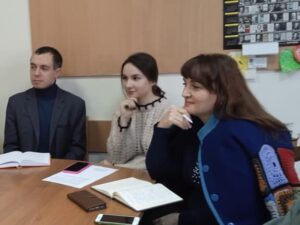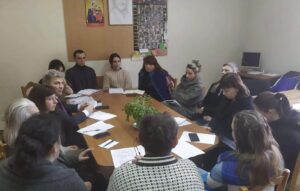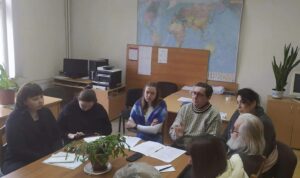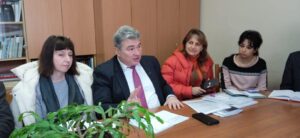From a practice-oriented educational program to a successful journalist
We are updating the educational programs for students of higher education, because the latest challenges dictate the new needs of the modern labor market for journalists. The rapid development of technological processes, a competitive media environment, and war dictate new requirements for the training of future specialists to journalists. In the dynamic process of forming educational programs, the opinion of those who employ our graduates and those who offer their skills to stakeholders has always been important.
This Wednesday, February 1, teachers and heads of departments of the Faculty of Journalism of the Lviv National University named after Ivan Franko – listened to the proposals of students of various courses on how to improve and update two educational programs – bachelor’s and master’s. The head of the student council of the Faculty of Journalism, Veronika Matvienko, a third-year student, said that representatives of all courses lively discussed the existing programs and made changes.
“We invited activist students, heads of groups from the first to the fourth year to the discussion of the educational program, a student who studied at the bachelor’s degree, and now – at the master’s degree, joined. We printed out the schedule and started looking: what should be changed, somehow transformed.”
Diana Sikorska, a first-year master’s student, a member of the student body of the Faculty of Journalism, already has experience studying in two educational programs – bachelor’s and master’s:
“We believe that some subjects should be shortened. And instead of two courses (four semesters), maybe one course (two semesters) would be enough or as an alternative to offer practice-oriented disciplines for the educational program. There are subjects that duplicate what what we have already studied at school and at the university – for example, from the history of philosophy. We need theory, but to a lesser extent, because today there is a need for more specific skills and professional knowledge.”
Participants of educational program support groups, heads of departments and guarantors agreed that the educational process should be practice-oriented, and the graduate of the faculty needed on the labor market. V. o. the head of the radio broadcasting and television department Paraskovia Dvoryanin noted:
“Now we have an interesting phenomenon – news journalism is turning into personality journalism. Our graduates must understand how PR technologies work, be able to develop a personal brand in social networks, analyze how the media market is dynamically changing and what platforms it currently uses. From the first year, we should teach students the tools that our graduates will need in the editorial office. And already within the framework of specialization, talk with them about convergence and the universal journalist, because this is the need of the hour.”
The guarantor and the teachers of the departments agreed with the students’ proposals – to update educational programs and focus on the practical aspect and requirements of the media market. The participants of the support groups also summarized what has already been done to develop the project of the educational program in accordance with the new standard for masters.



